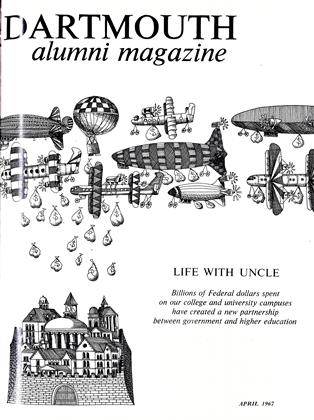SHEPARD A. STONE '29 is in the enviable position of being able to see some of his grander visions realized. He is Adviser on International Affairs to Ford Foundation President McGeorge Bundy and handles foreign grants.
Stone's emphases the last ten years have been concerned with "the building of institutional and human relationships in Western Europe and between Western Europe and the United States; initiatives to reestablish scholarly and other contacts between Eastern Europe and the West; the building of stronger links between Japan and the United States." He has made over 100-round trips across the Atlantic, not to mention other parts of the world.
He has a whiplash mind and machine-guns his sentences and ideas to the listener. Most of his forthright opinions are based on personal experience and firsthand knowledge of what can be done. He earned a Ph.D. at the University of Berlin in 1933 with a dissertation on German-Polish problems. In 1938 he published a prophetic book, Shadow Over Europe - TheChallenge of Nazi Germany.
Stone served as an Army intelligence officer from 1942 until 1946, reaching the rank of Lieutenant Colonel. He was recalled to Germany in 1949 to serve as Director of Public Affairs in the office of the U.S. High Commissioner and until 1952 assisted the Army in creating an information service, including newspapers and a radio station. The German Government gave him the Freedom Bell Award in 1950,
Before and after the War he worked for The New York Times, as a writer on foreign affairs from 1933 to 1942 and as Assistant Sunday Editor from 1946 to 1949.
Much of what he has accomplished through the Foundation involves the international press. The Foundation has helped support the 1500-member International Press Institute headquartered in Geneva.
"It is questionable," he says of the U.S. press, "whether many newspapers have really caught up with the requirements of their readers. Our struggling colleagues in the underdeveloped countries have much to learn from the Western press, and much to avoid."
The Foundation has recently granted $1 million for educational, scientific, and cultural exchanges between Eastern European countries and the U.S. Stone started negotiations for this in Poland in 1957.
In another vein, he initiated and the Foundation financed the first of four informal conferences between ten distinguished Soviet scholars, writers, artists, and administrators and a similar group of Americans held at Dartmouth in October 1960. Subsequent conferences were held at Yalta, Andover (Mass.), and Leningrad, and were still called the Dartmouth Conferences.
"The Soviets were much taken with Dartmouth and still ask about Hanover," he says.
He also initiated the first private, informal Japanese-American round table discussions at Dartmouth in 1962.
Stone has aided in the development of foreign philanthropies and cites the Volkswagen Works projects in Germany and a similar philanthropic organization in Japan.
Although he has vision, he lacks delusions even about an organization as powerful as the Foundation. He says:
"By their nature foundations are excluded from what the Greeks held to be the highest art - politics. Foundations recognize the fallacy of the proposition that money creates better ideas. Foundations cannot give imagination to the unimaginative or talent to the untalented."
 View Full Issue
View Full Issue
More From This Issue
-
 Feature
FeatureLife with Uncle
April 1967 -
 Feature
FeatureDICK'S HOUSE
April 1967 -
 Feature
FeatureUNCLE SAM AT DARTMOUTH
April 1967 By C. E. W. -
 Article
ArticleThe Undergraduate Chair
April 1967 By ART HAUPT '67 -
 Article
ArticleEloquence at Gettysburg and Daniel Webster
April 1967 By EARL W. WILEY '08 -
 Class Notes
Class Notes1920
April 1967 By MACOMBER, JOHN s. MAYER
Article
-
 Article
ArticleJANSSEN EX-'21, COMPOSER, RECEIVES HONORARY DEGREE
December, 1923 -
 Article
ArticleConcerts Open
December 1937 -
 Article
ArticleAn Orchid For White
February 1939 -
 Article
ArticleSummers in Africa
NOVEMBER 1988 -
 Article
ArticleThe Undergruduate Chair
January 1955 By G. H. CASSELS-SMITH '55 -
 Article
ArticleTuck School
April 1946 By H. L Duncombe Jr.

